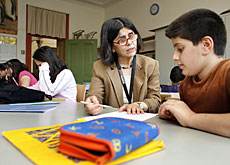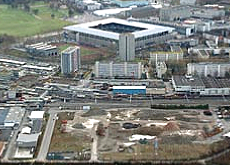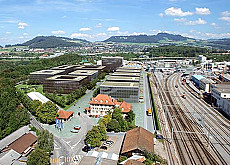Zurich introduces “Muslim friendliness” check

Amid a fierce debate about minarets, public services in canton Zurich are being tested to determine if they discriminate against Muslims.
The cantonal authorities commissioned the fact-finding study to provide a more solid foundation for an ongoing political debate on how Muslims practise their religion in Zurich.
The Zurich chapter of the rightwing Swiss People’s Party put forward a motion last August calling for a ban on the construction of “provocative” minaret towers on Muslim centres of worship.
This was followed by a similar national initiative earlier this year that was condemned by several government ministers.
Dr Thomas Widmer from Zurich University’s Institute of Political Sciences has been given the task of assessing the suitability of the canton’s health, education, penal and social services for the Muslim population.
“We will try to find out if the services provided by the cantonal authorities allow religious freedom for Muslims and, also, if these religious activities are disturbing other people using these services,” he told swissinfo.
“The Swiss constitution guarantees religious freedom and the canton must examine that this is not being violated.”
Widmer will consult experts from all four services before compiling the data and delivering recommendations towards the end of next year.
Ideology
The driving force behind the study is the debate on minarets. “There is quite an ideological discussion at the moment about minarets and Islamic extremists,” Widmer admitted.
“The goal of this study is to have a clearer picture of the situation and to be in a position to react accordingly. There is a desire to bring more substance into the political discussion that has so far been dominated by ideology.”
Dr Hisham Maizar, president of the Federation of Islamic Organisations in Switzerland, welcomed the research with the proviso that it represents a genuine dialogue with Zurich’s Muslim community.
“It is a good idea provided it includes the Muslim community as an equal partner from the start of the process,” he told swissinfo.
Explaining grievances
“The method of conducting a study and telling people ‘this is what we think and you must accept it’ is highly questionable. You must give people a chance to explain their grievances from the very beginning.
“I welcome this study in principle because it is important to find out such information,” Maizar said. “Until now no one has had the courage to talk about these things for fear of offending other religions.”
Maizar said the general relationship between Muslims and the Zurich authorities remained good despite the proposed minaret ban. He cited the creation of a Muslim graveyard in Zurich as an example of close cooperation.
“I cannot see any Muslims in Zurich suffering because they have not been accepted. Those who make the effort to integrate into society do not feel unwelcome,” he said.
swissinfo, Matthew Allen in Zurich
There are around 340,000 Muslims in Switzerland.
Almost 12% of them hold a Swiss passport.
Most of them come from the Balkans as refugees during the war in the former Yugoslavia or from Turkey.
Numbers have risen in recent years, up from 2.2% of the population in 1990 to 4.3% in 2000.
In Switzerland, more than three-quarters of the population are Christians – 42% are Catholic, 35% Protestant and 2.2% other Christian religions.
A minaret is a tower, traditionally part of a mosque, with a balcony from which a muezzin calls Muslims to prayer. In Switzerland only the mosques in Geneva and Zurich have a minaret, neither used to call for prayer.
Last year planning permission for minarets in Wangen in northern Switzerland and in Langenthal, canton Bern, were rejected, but the Federal Court finally gave the go-ahead last week to the Wangen project.
The initiative launched by the People’s Party Zurich section last August said minarets symbolise an “expansionist, aggressive religion”.
The national campaign to ban the construction of minarets, launched in May, will attempt to raise 100,000 signatures by November 2008 to force a ballot.
Plans to construct Europe’s largest Islamic centre in the Swiss capital, Bern, were rejected by the city authorities in June.

In compliance with the JTI standards
More: SWI swissinfo.ch certified by the Journalism Trust Initiative












You can find an overview of ongoing debates with our journalists here . Please join us!
If you want to start a conversation about a topic raised in this article or want to report factual errors, email us at english@swissinfo.ch.